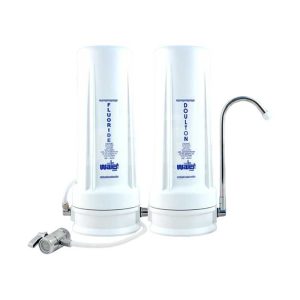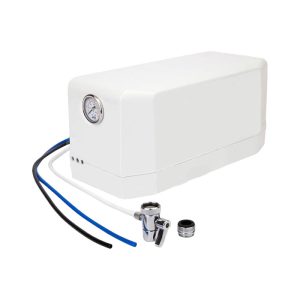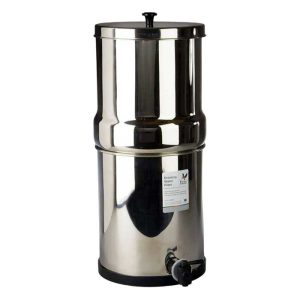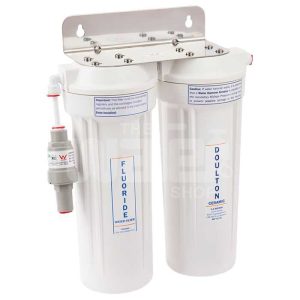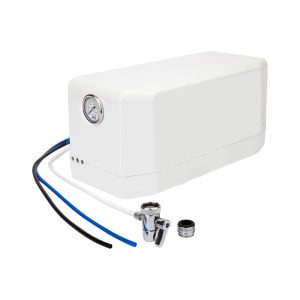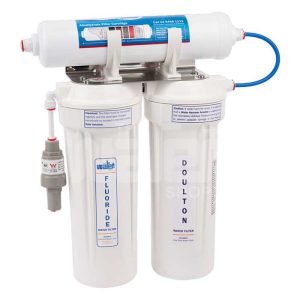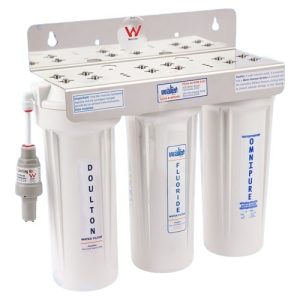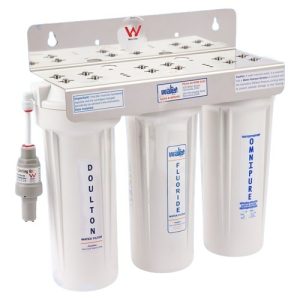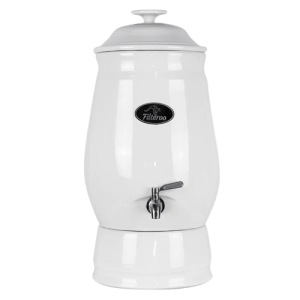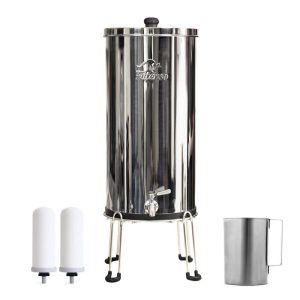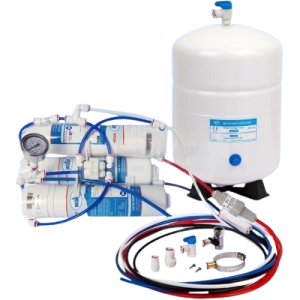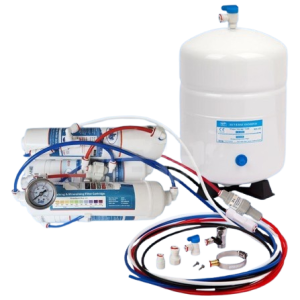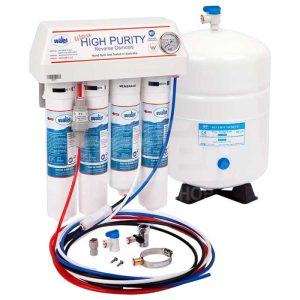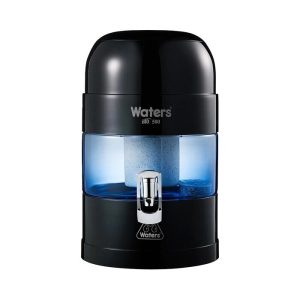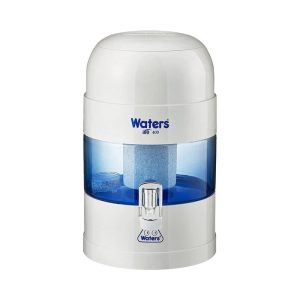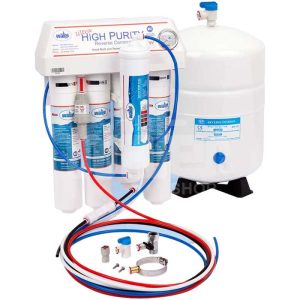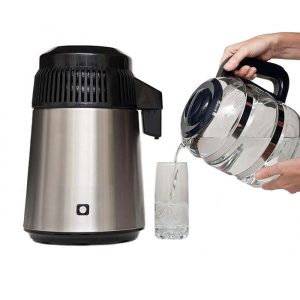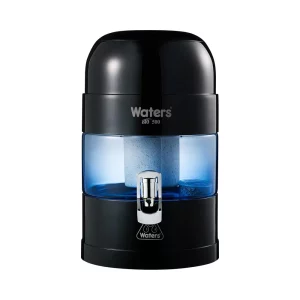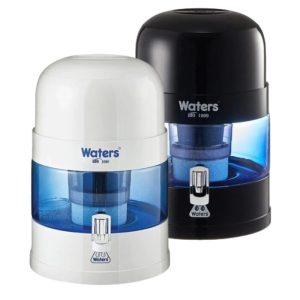Australia's Best
Fluoride Water Filters
You’ve made a decision to remove fluoride, which shows that you’re thinking. Now all you really need to do is work out which are the best water filters that remove fluoride.
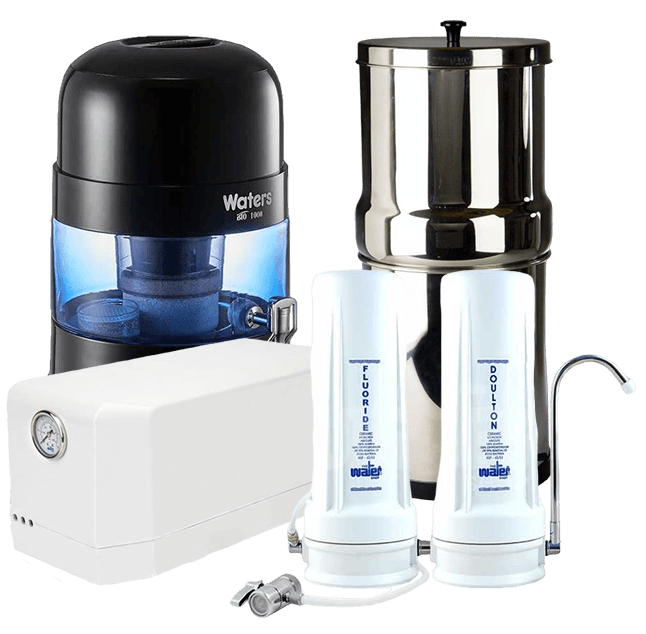
What is Fluoride?
Fluoride is a naturally occurring element however it must be emphasised that the fluoride that is added to water supplies is not the naturally occurring type. Instead, it is usually a synthetic form of fluoride, such as sodium fluoride, fluorosilicic acid, or sodium fluorosilicate.
Excess exposure to fluoride can also have negative health effects, including skeletal fluorosis and dental fluorosis. As such, it is important to maintain a safe and balanced intake of fluoride.
One way to achieve this is through the use of fluoride water filters, which can remove excess fluoride and other contaminants from drinking water. Below you’ll find the best fluoride filter Australia has to offer.
Water Filters that Remove Fluoride
Our dependable range of water filters that remove fluoride.
Doulton Twin Countertop Water Filter with Fluoride Removal
- Benchtop Water Filters, Fluoride Water Filters, PFAS Water Filters
- $344.00 inc. GST
- Select options This product has multiple variants. The options may be chosen on the product page
- Sale!
Countertop Reverse Osmosis Water Filter – 3 Stage
- Countertop Reverse Osmosis, Benchtop Water Filters, Fluoride Water Filters, PFAS Water Filters, Reverse Osmosis Water Filters
-
$409.00Original price was: $409.00.$379.00Current price is: $379.00. inc. GST - Add to cart
British Berkefeld Water Filter – 16L Gravity Water Filter
- Benchtop Water Filters, Fluoride Water Filters, Gravity Water Filters
- $395.00 – $490.00 inc. GST
- Select options This product has multiple variants. The options may be chosen on the product page
Doulton Twin Under Sink Water Filter with Fluoride Removal
- Fluoride Water Filters, PFAS Water Filters, Under Sink Water Filters
- $438.00 inc. GST
- Select options This product has multiple variants. The options may be chosen on the product page
Doulton Twin Under Sink Water Filter with Fluoride Removal and Alkaliser
- Under Sink Water Filters, Fluoride Water Filters
- $454.00 – $514.00 inc. GST
- Select options This product has multiple variants. The options may be chosen on the product page
Filteroo® Joey 12L Ceramic Gravity Water Filter with Fluoride Removal
- Ceramic Water Filters, Benchtop Water Filters, Fluoride Water Filters, Gravity Water Filters
- $469.99 inc. GST
- Select options This product has multiple variants. The options may be chosen on the product page
Filteroo® Superoo Stainless Steel Gravity Water Filter
- Benchtop Water Filters, Fluoride Water Filters, Gravity Water Filters
- $514.99 – $719.99 inc. GST
- Select options This product has multiple variants. The options may be chosen on the product page
Compact Ultra High Purity Under Sink Reverse Osmosis System with Alkaliser – 4 Stage
- Reverse Osmosis Water Filters, Fluoride Water Filters, PFAS Water Filters, Under Sink Reverse Osmosis, Under Sink Water Filters
- $679.00 – $739.00 inc. GST
- Select options This product has multiple variants. The options may be chosen on the product page
- Sale!
Waters Co BIO 500 Benchtop Water Filter
- Benchtop Water Filters, Fluoride Water Filters, Gravity Water Filters, PFAS Water Filters
-
$799.00Original price was: $799.00.$749.00Current price is: $749.00. inc. GST - Add to cart
- Sale!
Waters Co BIO 400 Benchtop Water Filter
- Benchtop Water Filters, Fluoride Water Filters, Gravity Water Filters, PFAS Water Filters
-
$799.00Original price was: $799.00.$779.00Current price is: $779.00. inc. GST - Add to cart
Ultra High Purity Under Sink Reverse Osmosis System with Alkaliser – 5 Stage
- Under Sink Reverse Osmosis, Fluoride Water Filters, PFAS Water Filters, Reverse Osmosis Water Filters, Under Sink Water Filters
- $790.00 – $850.00 inc. GST
- Select options This product has multiple variants. The options may be chosen on the product page
Megahome Water Distiller Australia
- Benchtop Water Filters, Fluoride Water Filters, PFAS Water Filters, Water Distillers
- $796.00 – $885.00 inc. GST
- Select options This product has multiple variants. The options may be chosen on the product page
- Sale!
Waters Co BIO 500 Max 7 Benchtop Water Filter
- Benchtop Water Filters, Fluoride Water Filters, Gravity Water Filters, PFAS Water Filters
-
$849.00Original price was: $849.00.$799.00Current price is: $799.00. inc. GST - Add to cart
- Sale!
Waters Co BIO 1000 Benchtop Water Filter
- Benchtop Water Filters, Fluoride Water Filters, Gravity Water Filters, PFAS Water Filters
-
$1,249.00Original price was: $1,249.00.$979.00Current price is: $979.00. inc. GST - Select options This product has multiple variants. The options may be chosen on the product page
Fuoride Under Sink Water Filters
Our range of dependable under sink fluoride filters.
Doulton Twin Under Sink Water Filter with Fluoride Removal
- Fluoride Water Filters, PFAS Water Filters, Under Sink Water Filters
- $438.00 inc. GST
- Select options This product has multiple variants. The options may be chosen on the product page
Doulton Twin Under Sink Water Filter with Fluoride Removal and Alkaliser
- Under Sink Water Filters, Fluoride Water Filters
- $454.00 – $514.00 inc. GST
- Select options This product has multiple variants. The options may be chosen on the product page
Compact Ultra High Purity Under Sink Reverse Osmosis System with Alkaliser – 4 Stage
- Reverse Osmosis Water Filters, Fluoride Water Filters, PFAS Water Filters, Under Sink Reverse Osmosis, Under Sink Water Filters
- $679.00 – $739.00 inc. GST
- Select options This product has multiple variants. The options may be chosen on the product page
Ultra High Purity Under Sink Reverse Osmosis System with Alkaliser – 5 Stage
- Under Sink Reverse Osmosis, Fluoride Water Filters, PFAS Water Filters, Reverse Osmosis Water Filters, Under Sink Water Filters
- $790.00 – $850.00 inc. GST
- Select options This product has multiple variants. The options may be chosen on the product page
What are Fluoride water filters?
Fluoride filters are designed to remove fluoride from water and they work using a range of methods to physically or chemically trap contaminants as water passes through them. There are several types of fluoride water filters available and each has its own unique advantages and disadvantages that make choosing the best water filter to remove fluoride a personal choice.
Activated alumina filter is a common method of fluoride water filtration and uses a type of aluminum oxide to remove fluoride from water. These filters are relatively inexpensive and simple to install, but they will need to be replaced frequently.
Another type of fluoride water filter is the reverse osmosis filter, which employs a semi-permeable membrane to trap the fluoride particles. RO water filters are very effective at removing fluoride and other unwanted toxins in your water.
Water distillation uses heat to evaporate the water, which leaves behind the Fluoride and any other contaminants that have a higher boiling point than water. Water distillers are extremely effective at removing fluoride, but they can be slow and require a lot of energy to operate.
If you’re choosing ceramic fluoride water filter then you’ll need to ensure that you have the correct candle insert to ensure fluoride removal.
How fluoride water filters work
Fluoride water filters use a range of methods to remove excess fluoride and other contaminants from drinking water. One of the more common methods used by fluoride water filters is adsorption, which physically traps the contaminants in a porous material. This can be achieved through the use of activated alumina or bone char, both of which have high absorption rates for fluoride.
Reverse osmosis is another popular method used by fluoride water filters. It works by forcing water through a semi-permeable membrane that traps contaminants like fluoride, leaving behind clean water. Reverse osmosis is highly effective at removing fluoride and other impurities, but it can be wasteful on water and requires installation.
Distillation is another method used to remove fluoride. The water is boiled to create steam, which is then collected, cooled and condensed back into liquid. The fluoride is left behind in the boiling chamber and is not present in the clean water.
Ion exchange is another less popular method used to filter fluoride. It uses a resin to exchange ions, removing impurities such as fluoride. The resin absorbs fluoride ions and releases harmless ions in exchange.
Types of Fluoride water filters
The most common fluoride water filters.
Activated Alumina filters
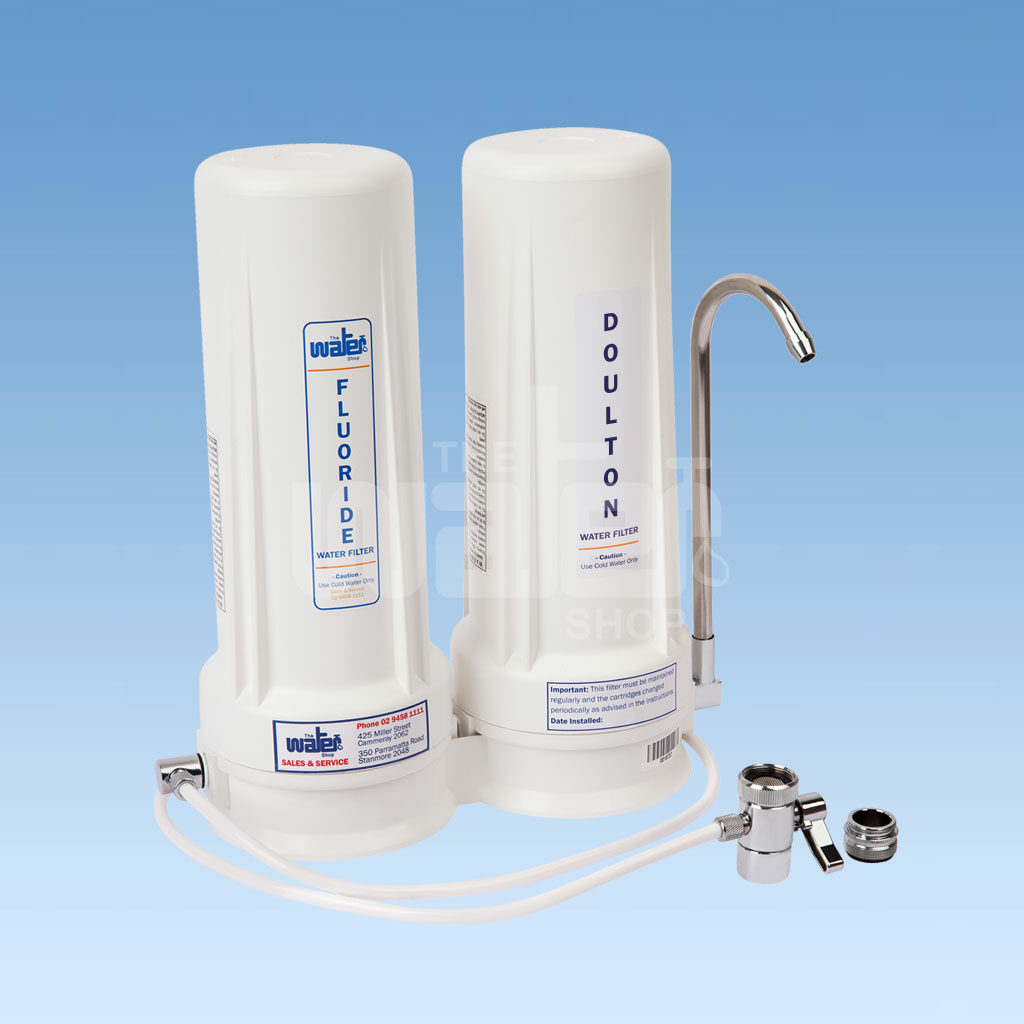
Activated alumina filters are a common type of fluoride water filter that use a special type of aluminum oxide to remove fluoride and other contaminants from water. Activated alumina is a highly porous material that has a large surface area, allowing it to trap impurities as water passes through it.
Activated alumina filters work through a process known as adsorption. As water flows through the filter, fluoride ions are attracted to the surface of the activated alumina, where they become trapped in the pores of the material. Other contaminants such as arsenic, lead, and selenium are also removed through this process.
One of the advantages of activated alumina filters is that they are relatively inexpensive and as a benchtop water filter they are very easy to install. They do not require electricity or any special plumbing and can be used in a variety of settings, from homes to commercial buildings.
However, there are some downsides to using activated alumina filters. One of the main drawbacks is that they can have a slow water flow rate, which can be frustrating for some users. Additionally, activated alumina filters may need to be replaced frequently in order to maintain their effectiveness, which can add to their overall cost.
Advantages:
- Effective at removing fluoride from water
- Inexpensive to purchase and easy to use
- Can be used for a long period of time before replacement
Disadvantages:
- Can remove beneficial minerals from water
- May require frequent replacement, depending on the quality of the source water
- May not be as effective at removing other contaminants as some other types of filters
Reverse Osmosis Filters
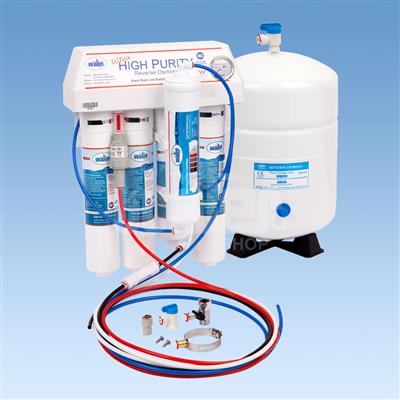
Reverse osmosis (RO) filters are another popular type of fluoride water filter. These filters use a semi-permeable membrane to remove impurities from water, including fluoride, chlorine, and other contaminants.
RO filters work by forcing water through a membrane that is designed to trap impurities. The membrane has tiny pores that are smaller than the size of a water molecule, which allows it to remove even the smallest particles from the water.
One of the advantages of RO filters is that they are highly effective at removing fluoride and other impurities from water. They can remove up to 99% of fluoride and other contaminants, making them one of the most effective types of water filters available.
However, there are some downsides to using RO filters. One of the main drawbacks is that they can be expensive to purchase and install. Additionally, they require a certain level of maintenance to keep them functioning properly, such as periodic cleaning and membrane replacement.
Another downside of RO filters is that they can produce a lot of wastewater. For every liter of purified water produced, an RO filter can generate anywhere from 2.5 to 10 liters of wastewater, depending on the quality of the source water and the type of filter being used.
Advantages:
- Highly effective at removing fluoride and other contaminants from water
- Can be used for a long period of time before replacement
- Easy to use and relatively low maintenance
Disadvantages:
- Can be expensive to purchase and requires installation
- Can generate a lot of wastewater
- May remove beneficial minerals from water
Water Distillers
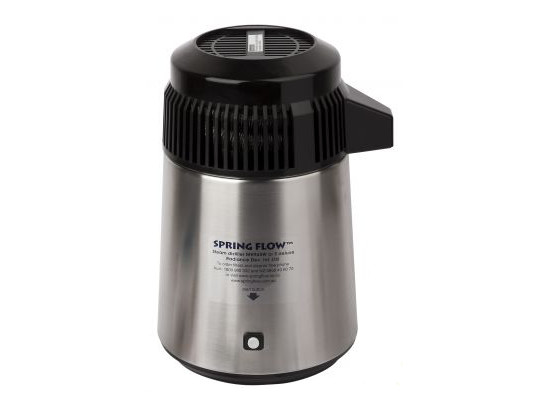
Does distilling water remove fluoride? Water distillation is another method that can effectively remove fluoride and other impurities from water. Water distillers work by boiling water and then condensing the steam into pure water, leaving behind contaminants.
Water distillation is very effective at removing a wide range of impurities from water, including fluoride, chlorine, lead, and other contaminants. They produce high-quality water that is free from impurities, making it a great choice for those who want to ensure that their drinking water is as clean and pure as possible.
One of the advantages of water distillers is that they can remove up to 99% of fluoride and other contaminants from water. They are also easy to use and require minimal maintenance and for these reasons we consider them to be the best fluoride tap water filter.
However, one of the drawbacks is that a high quality water distiller Australia can be quite expensive and they require a electricity to operate.
Advantages:
- Highly effective at removing fluoride and other contaminants from water
- Produces high-quality, pure water
- Requires minimal maintenance
Disadvantages:
- Quality water distillers can be expensive
- Can be slow to produce purified water
- Requires electricity
Ion Exchange Resins
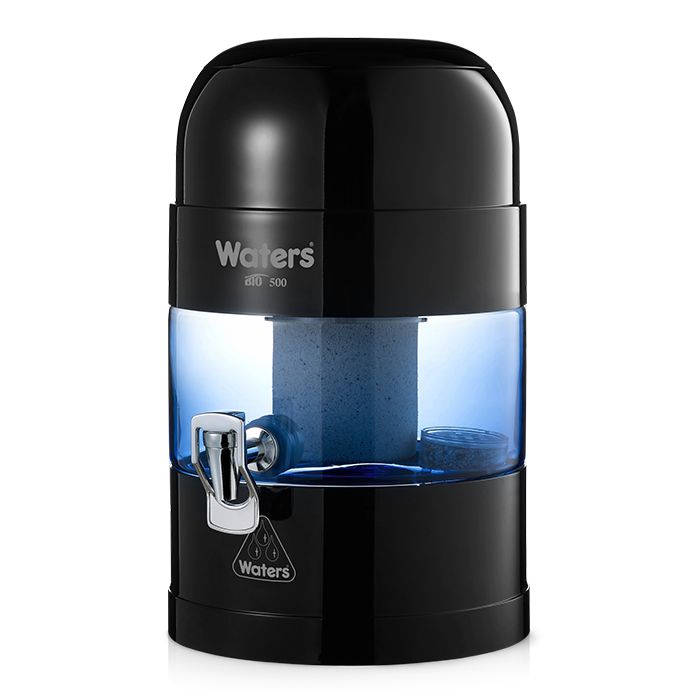
Ion exchange resins can be used to remove fluoride from water. Fluoride removal resin is typically a synthetic material with a strong attraction to fluoride ions. The resin releases other ions into the water, usually hydroxide or chloride ions, in exchange for the fluoride ions.
In the ion exchange procedure, resin beads are used to filter the water. Fluoride ions in the water bind to the resin, whereas hydroxide or chloride ions are released back into the water, when the water passes through the resin. Once all the resin beads have been saturated with fluoride ions, the procedure must be repeated, either by regenerating the resin or replacing it.
The resin used in ion exchange can successfully remove fluoride from water, but it can also remove other minerals and ions. Thus, it is crucial to make sure the water is remineralised before being consumed. To achieve optimal performance, ion exchange using resin also calls for frequent maintenance, including regeneration or replacement of the resin.
Advantages:
- Ion exchange resin is a reliable and effective method for removing fluoride from water
- The process of ion exchange is relatively simple and does not require any special skills or training
- Ion exchange resin can be used to remove a wide range of other contaminants from water, including nitrates and heavy metals
- Once the system is set up, the resin will consistently remove fluoride from the water until it becomes saturated, at which point it can be regenerated or replaced
Disadvantages:
- The cost of purchasing and maintaining an ion exchange resin system can be relatively high
- The capacity of the resin can be limited, and the system may need to be regenerated or replaced frequently, depending on the level of fluoride in the water
- The system requires regular maintenance to ensure its effectiveness, including the replacement or regeneration of the resin and monitoring the water quality
- Ion exchange resin not only removes fluoride but also other beneficial minerals from the water. Hence, it’s essential to remineralise the water before consumption

